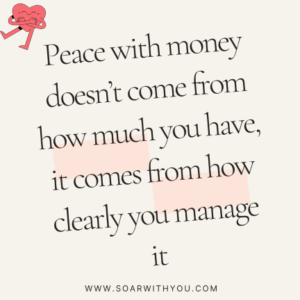Part 4: Make Peace With Your Money — Reclaiming Control Over Your Financial Well-being
Introduction: Money Is More Than Numbers
Money is emotional.
We often treat it like it’s just numbers and logic, but in real life, money carries weight.




An interesting perspective: money isn’t just math—it’s a mindset.
And when our money mindset goes unchecked, it influences everything—how we value ourselves, how we set boundaries, and how confidently we move through life.
We've been taught to push forward, hustle hard, and maybe one day, we’ll earn “enough” to feel secure. The fact however, remains: you can earn more and still feel broke.
Why? Because peace with money doesn’t come from how much you have—it comes from how you manage what you already have.
My Turning Point: From Hustle to Ownership
I didn’t always think this way.
In my early working years, I was focused on earning, not managing. I’d get paid, pay the bills, spend the rest, and repeat. No plan. No strategy. Just hustle and hope.
And honestly? It worked—until it didn’t.
What I eventually learned was this: If you don’t give your money direction, someone else will.
Retailers, emergencies, impulse purchases, and social pressure will gladly spend your money for you.
It wasn’t until I began to look at money as something I needed to steward, not just spend, that I began to feel truly in control. It wasn't about becoming a financial expert—it was about becoming the CEO of my wallet.
And the shift didn’t require a massive income boost. It started with intentional, consistent actions. Actions that I still take to date.
The beginning of my turning point came when I read two books that I highly recommend for anyone trying to get control over their finances as a start. These are Rich Dad Poor Dad by Robert Kiyosaki and The Richest Man in Babylon by George S Clason. Highly recommended!
Why Financial Peace Is About More Than Budgeting
Budgeting is helpful, but it’s only one part of a bigger picture.
Real peace with money begins when you’re willing to explore your financial beliefs and habits with honesty and compassion.
Many of us learned unspoken “rules” about money growing up:
- “Money is hard to manage.”
- “I’m not good with finances.”
- “Once I make more, I’ll figure it out.”
In response, we either over-control every cent or avoid looking at the numbers altogether. Both approaches are rooted in fear.
Fear, however, won’t give you peace; it will only limit you and keep you in an endless cycle of lack and want. Engagement, on the other hand, will give you peace.
You don’t need to know everything. You just need to start paying attention—without shame. Here are 3 ways you can take immediately to start taking charge of your money.

 3 Steps to Start Making Peace With Your Money
3 Steps to Start Making Peace With Your Money
These aren’t complex systems or financial hacks. They’re simple practices to help you reconnect with your money, align it with your values, and use it with confidence.
 Do a Weekly Money Check-In
Do a Weekly Money Check-In
Money clarity shouldn't just happen at the end of the month when you’re paying bills or when you’re facing a shortfall, it should happen weekly. This is important, especially when you’re not sure how your money gets finished and gets spent.
Set aside 15–30 minutes to review:
- What came in
- What went out
- What needs adjusting
This check-in builds awareness, which is the first step toward alignment.
Try This:
→ Create a “Money Monday” or “Finance Friday” ritual. Brew a cup of tea, play some calming music, and make it feel nurturing instead of stressful. I still have a pop-up on my calendar every Friday titled ‘Money Matters’, which has always been a reminder I used to get me into the habit of checking.

- Budget Planner Organizer – Visual tool to categorize expenses and goals
- Cash Envelope Wallet System – Helps manage specific categories with intention
 Automate Something Small
Automate Something Small
You don’t have to control everything manually. Automate what you can. This is especially so when you need to create a savings culture or to make a payment for a recurring expenditure. When you automate, it removes the pressure of deciding whether you should at all spend the money in a certain way, save it, or not. When it’s automated, you don’t face the temptation to spend it otherwise.
You could start with:
- A weekly or monthly $5–$10 savings transfer
- Auto-pay on recurring bills
- A monthly deposit into an emergency or goal-specific fund
I have a standard amount that I set aside every month into some investment venture that compounds over time. This gives me some peace of mind for the rainy day. That tiny habit gives me a way to reward myself, without guilt or disruption to my budget.
 Make a Plan for Your Money
Make a Plan for Your Money
Intentional living demands intentional money. It’s not enough to earn and spend—we need a plan for where our money should go and who it should serve.
That plan doesn’t need to be rigid, but it does need to reflect your values and priorities. Whether you’re paying off a loan, saving for a milestone, or simply trying to spend more mindfully, having a financial roadmap gives you a sense of direction—and relief.
Start with your current obligations.
If you have outstanding debts, make a list of them and face them with compassion, not shame. Choose one small win to tackle first, whether it’s paying down the smallest balance or the one with the highest interest. Progress builds confidence.
Next, trim what no longer aligns.
We often underestimate how much we spend on things we no longer need, use, or value. Take time to review subscriptions, impulse categories, or convenience habits that quietly chip away at your bigger goals.
Then, set an intention for the future.
Maybe it’s a business idea. Maybe it’s investing in your child’s education, or your own personal development. Give that dream a budget. Even if you start with a small amount, it’s a plan. And a plan gives your money purpose.
Try This:
→ Create three priority categories in your budget: Debt Reduction, Life Essentials, and Growth Goals.
→ Assign percentages or small fixed amounts to each, so your money is always moving in alignment with what matters most.

- Debt Snowball Tracker – A printable tool to help you reduce debt step-by-step
Investment Journal or Planner – For tracking long-term goals and ideas - “Smart Women Finish Rich” by David Bach – A money mindset book written especially for women navigating life and wealth





Now that we’ve explored money with intentionality, we’re moving to another area of personal power:
Growth.
In Part 5, we’ll talk about why your development shouldn’t depend on external validation—and how to invest in yourself like the asset you are.

Download your Money Check-In Template to build a weekly rhythm that creates clarity, peace, and power.
If you missed part 3, you can check it out here on Owning your energy

